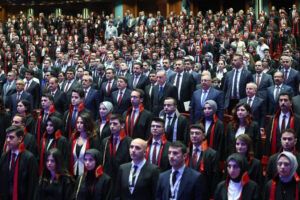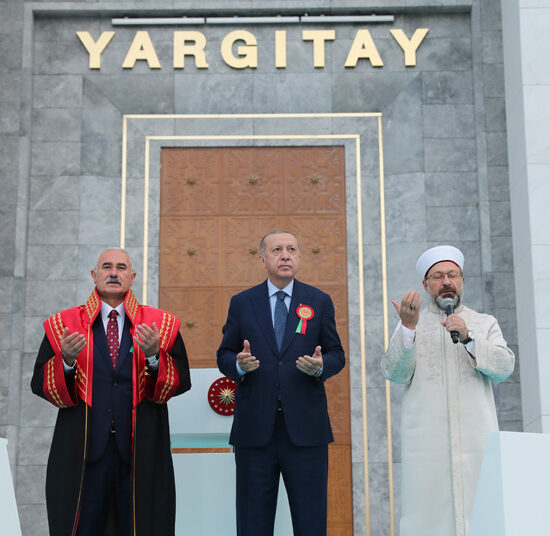Abdullah Bozkurt/Stockholm
After a decade-long campaign, the Islamist government of President Recep Tayyip Erdogan has finally gained full control of the Turkish judiciary, with most, if not all, judges and prosecutors willingly aligning themselves with the views of the executive branch.
The consolidation of control within the Turkish judiciary by Erdogan was facilitated through extensive purges and the imprisonment of numerous independent judges and prosecutors. This strategic maneuvering included the recruitment of a fresh group of jurists comprising political Islamists, nationalists and neo-nationalists, along with the appointment of partisan lawyers to pivotal roles as judges and prosecutors.
These measures collectively served as instrumental in Erdogan’s gaining total dominance over the Turkish judicial landscape.
The metamorphosis accomplished under Erdogan’s long-pursued agenda has yielded a formidable consolidation of both executive and judicial authority, affording him unprecedented leverage to exploit the criminal justice system for political ends.
This ominous shift has manifested itself in the arbitrary imprisonment of domestic adversaries under spurious pretexts, the adoption of hostage diplomacy through the incarceration of foreign nationals in Turkish prisons and the systematic vilification and defamation of dissenting voices via contrived criminal probes.
Number of judges and prosecutors according to yearly breakdowns:
Given that Erdogan and his political allies command a majority in the Turkish parliament, the government has the ability to enact and revise legislation at will. As a result, Erdogan now wields an unparalleled degree of authority in Turkey, an unprecedented phenomenon in recent Turkish political history.
With an iron grip extending across the judicial, executive and legislative branches, Erdogan’s rule has ushered in an era of near-absolute power consolidation, fundamentally reshaping the landscape of Turkish politics and governance.
Based on the most recent data released in February by the Ministry of Justice, the number of judges and prosecutors employed by the government at year-end 2023 stood at 21,647, marking a substantial increase of 89 percent compared to the figures recorded in 2013.
In 2013 the Erdogan government initiated a sweeping crackdown on judges and prosecutors, particularly in the aftermath of explosive revelations surrounding corruption cases that were made public in December of that year. These investigations implicated Erdogan and his inner circle in allegations of bribery and abuse of power.
At the center of these cases was the involvement of Reza Zarrab, a Turkish-Iranian sanctions buster who enlisted Erdogan and his ministers in a scheme to launder Iranian state funds through the Turkish banking and financial systems. The investigations also implicated a Saudi businessman, Yasin al-Qadi, who had previously been listed as a financier for al-Qaeda by both the United Nations and the United States.

Erdogan orchestrated the quick removal of all judges, prosecutors and police chiefs who had been instrumental in uncovering the graft schemes. In their place, he installed loyalists who aided in the suppression of these investigations, effectively quashing any prospects of accountability. This was achieved despite the existence of a substantial body of evidence indicating egregious violations of numerous Turkish laws.
In 2014, with the takeover of the Supreme Council of Judges and Prosecutors (HSYK, later renamed the Council of Judges and Prosecutors, or HSK) by Erdogan’s government, prominent judges and prosecutors who had investigated and/or tried cases involving illegal arms shipments to jihadists, including the Islamic State in Iraq and Syria (ISIS), as well as those who had probed the network of the Iranian Islamist Revolutionary Guards (IRGC) Quds Force in Turkey, were dismissed and later imprisoned by the government in 2015.
The most devastating blow to independent judges and prosecutors occurred in July 2016, following a failed military coup, a false flag that was engineered by the Turkish intelligence agency. This orchestrated event served as a pretext for the summary and arbitrary mass dismissal of government employees. Within hours of the failed coup, the government began to round up thousands of judges, including those who held seats on the Supreme Court of Appeals and the Constitutional Court.
According to official statistics, the initial government campaign in 2016 resulted in the purge of 4,359 judges and prosecutors, with hundreds more subsequently subjected to specious criminal investigations in the ensuing years, culminating in a total of 4,646 individuals affected. In essence, approximately 30 percent of all judges and prosecutors found themselves dismissed from their positions.
In the same year the Erdogan government swiftly moved to address the vacancies by appointing 3,800 new judges and prosecutors. However, these appointments were based on political allegiance rather than the principles of a meritocracy. Approximately half the newly recruited individuals were lawyers who had served in Erdogan’s ruling Justice and Development Party (AKP) branches. The remaining appointees were vetted to ensure their adherence to the ideology of the Islamist government, thereby guaranteeing alignment with the government’s preferences in their rulings.
Turkey’s scorecard at the European Court of Human Rights (ECtHR):
Regulations were also amended to facilitate the placement of new recruits on high criminal court benches, typically reserved for individuals with long years of service in lower courts.
Following the swift filling of vacancies, the Erdogan government further expanded the judiciary by doubling its size over the span of a decade, a move aimed at bolstering the presence of partisan loyalists within the ranks of judges and prosecutors. As of 2024 the total available positions for judges and prosecutors number 28,233, including 4,466 vacancies.
The government intends to recruit 2,105 new judges and prosecutors this year.
Presently, the Turkish judiciary is entirely subordinate to the Erdogan government, now infamous for its exploitation of the criminal justice apparatus to incarcerate political opponents and critics, confiscate their assets and ruin their reputations.
Similar transformations extended to other personnel within the Ministry of Justice, where 7,530 employees, including court clerks and paralegals, were summarily dismissed from their positions in 2016 and 2017.
The practice of dismissals persists, albeit at a much-reduced pace, particularly when judges and prosecutors draw the ire of the government through rulings that challenge its interests. In such cases, they face immediate reassignment or dismissal from their positions.

The erosion of Turkey’s judiciary in upholding fundamental rights and freedoms under the repressive Erdogan government is evidenced by the significant increase in the number of complaints filed with the European Court of Human Rights (ECtHR).
According to the latest statistics from the court, as of March 18, 2024 Turkey held the top position among the 46 Council of Europe member states, with 419 “leading cases,” highlighting structural and systemic issues within its judiciary.
As of January 1, 2024, Turkey had a total of 23,371 cases pending at the ECtHR, solidifying its position as the country with the highest case count before the court.
Since 2012, the ECtHR has imposed fines totaling 152 million euros on Turkey for damages to be paid to victims of rights violations. However, despite the escalating number of judgments against Turkey for rights violations and the imposition of fines, the Erdogan government appears undeterred in its actions.
Within the machinery of governance under the Erdogan government, the principle of the separation of powers, traditionally considered a cornerstone of democracy, has been rendered obsolete. The independence and impartiality of the judiciary have been systematically undermined, while the integrity of democratic institutions has been compromised.
The unchecked concentration of power in Erdogan’s hands has precipitated the suspension of the rule of law. Consequently, Turkey has been transformed into a sort of tyranny, characterized by rampant abuse of power, political interference in judicial proceedings and systematic violations of fundamental rights and freedoms, which have tragically become the norm rather than the exception in the country.












